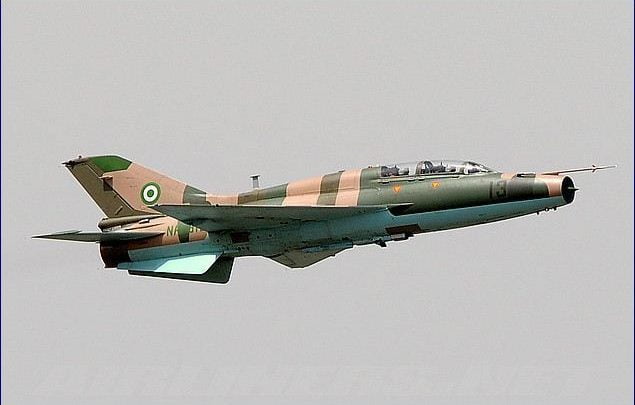How military accidental strikes killed 425 persons in 6 years – Report
Approximately 425 persons, including children and women, had been reportedly killed by military accidental bombings between September 2017 and December 2023.
A report titled “Air Force Mishaps” by a research organisation that compiles and analyses data about happenings in the country (SBM Intelligence) in February 2023, revealed that over 300 civilians had been killed in accidental airstrikes by the NAF since 2017.
SBM said the airstrikes happened while the NAF was in pursuit of terrorists.
The report lamented that mishaps had increased in the last two years, adding that no compensation had been paid to victims’ families.
According to SBM Intelligence, the mistakes have increased in the last two years with little acknowledgement from the NAF.
It added that Niger, Yobe, Zamfara, Borno, Nasarawa, Kaduna, and Katsina are the worst-hit states in the country.
In January 2023, it was reported that 37 people including 27 pastoralists were killed after a bomb exploded at the border linking Benue and Nasarawa States at the Doma local government area of Nasarawa State.
In April 2022, a NAF fighter jet reportedly killed six children, when it fired a bomb targeted at terrorists in Kurebe village in Shiroro LGA of Niger State.
Also in June 2022, 13 residents were injured while one other died after a NAF fighter jet struck Kunkuna village in the Safana LGA of Katsina State.
On January 17, 2017, about 52 people were killed while 120 others sustained injuries in an accidental airstrike on an Internally Displaced Persons camp in Rann, Borno State.
Also, on April 13, 2020, 17 people, including children, were killed after a NAF fighter jet bombed Sakotoku village in Damboa LGA of the State.
The most recent of all is the Kaduna village bombing mishap where 85 villagers in Tudun Biri of the Igabi Local Government Area of Kaduna State were feared dead after a bomb was allegedly dropped by a military jet on Sunday.
Residents of the affected communities said they were celebrating Maulud, an Islamic event when the bombs were dropped by the military.
This development has, however, triggered both local and international condemnation.
Following the incident a mass burial was conducted for the victims on Tuesday while the Army claimed responsibility for dropping the bomb on the village.
Meanwhile, President Bola Tinubu has ordered an investigation into the military drone strike that killed 85 civilians gathered for a religious celebration over the weekend.
In a statement released by his spokesperson Ajuri Ngelale on Tuesday, Tinubu said that the “bombing mishap” was worrying and “painful”.
“The President directs a thorough and full-fledged investigation into the incident and calls for calm while the authorities look diligently into the mishap,” Ngelale said.
Kaduna State Governor, Uba Sani, said civilians were “mistakenly killed and many others were wounded” by a drone “targeting terrorists and bandits”.
The National Emergency Management Agency said in a statement on Tuesday that “85 dead bodies have so far been buried while search is still ongoing”.
Meanwhile, Amnesty International’s Nigeria office said 120 people were killed in the attack, citing reports of its workers and volunteers in the area.
“Many of them were children and more dead bodies are being discovered,” the group’s director in Nigeria, Isa Sanusi, told the Associated Press.
At least 50 bodies were recovered, according to Igabi resident Mustapha Rufai.
“They said they mistakenly threw a bomb on them,” he said.
The Tudun Biri incident is just one in a long list of recent bomb attacks against residents of northern Nigeria.
Since 2009, the conflict between armed groups, including the Sunni Group for Preaching and Jihad — commonly known as Boko Haram — and the armies of Nigeria and the sub-region has caused the death of a considerable number of civilians. According to Doctors without Borders, the 2.9 million or so displaced persons and refugees in the Lake Chad region (UN 2020), and particularly in North East Nigeria (more than 2 million displaced), live in towns, camps or enclaves controlled by the military, in extremely precarious conditions.
The war between Boko Haram and the government intensified in 2015 with the Nigerian Army’s offensive and the help of neighboring countries to drive Boko Haram out of the main towns in Borno State.
While the Nigerian Army continues its operations against the insurgents, armed groups affiliated to Boko Haram are pursuing their strategy of terror, multiplying attacks and massacres in the Lake Chad region.
Between February 2014, when a Nigerian military aircraft dropped a bomb on Daglun, in Borno State, killing 20 civilians, and September 2022, more than 14 documented cases of this type of bombing have been recorded in residential areas by various NGOs.
In a statement published last June, Human Rights Watch called for greater transparency on the part of the Nigerian authorities, who had “provided little information and failed to do justice for a military air strike that killed 39 civilians and injured at least six others on 24 January 2023.”
Rebel attacks have ravaged parts of Nigeria’s North West and central regions. The country’s forces frequently target the hideouts of armed groups with aerial bombardment but have sometimes bombed villagers.
The groups, known as bandits, have raided villages, attacked an Air Force fighter jet and a train, and kidnapped people of all ages, including children, for ransom.
The latest bombing caused outrage among citizens, underscoring continued allegations of human rights abuses by Nigerian security forces that have raised concerns from Western allies, including the United States.
In February 2023, two members of the US House of Representatives Foreign Affairs Committee called on the Biden administration to halt $1bn in arms assistance for Nigeria following reports on the targeted killing of children by the Nigerian military and a programme of forced abortions for women in the north, many of whom were victims of sexual violence by the group Boko Haram.


